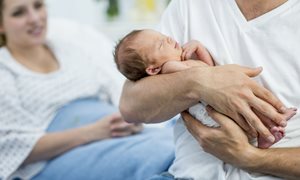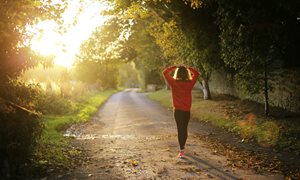
While the corona crisis affects all of us, people who have just started a family or are trying to, are doing this in a sub-optimal situation. Researchers from Radboudumc, Radboud University and Tilburg University are trying to find out how the ongoing crisis is affecting people with a desire to have children, pregnant women and their partner’s, and young parents.
During the peak of the crisis in spring, approximately 3,000 people already participated in the COPE Study (COVID-19 and Perinatal Experiences), which is part of an international study investigating COVID-19 related positive and negative experiences in (future) parents.
Now that the second wave has arrived, the researchers are looking for more participants. “It is now more important than ever to learn from the first-hand experiences of (future) parents”, researcher Stefania Vacaru explains. “This group of people in particular might experience that they don't get all the information they need. Therefore, I think it is essential to investigate how the coronavirus affects the current and possibly the future generation and provide evidence-based timely information.”
The ultimate goal is to help future parents to cope with the current and future crises, by understanding the impact that the pandemic has on their life during the perinatal period. "This will help researchers, policy makers, medical staff and midwifes to take action and put in place support systems for (future) parents. We already know that stress has negative consequences on our wellbeing, so it is our priority to address these effects in this target group.”
Continue to learn about the crisis
Participants are asked to fill in an online questionnaire regarding the impact of COVID-19 on several aspects of their lives, such as wellbeing, social aspects, work, community, access to healthcare etc. Researchers are interested, among other things, in the effects of the crisis on early childcare practices, such as co-sleeping and breastfeeding.
For some people, the second wave may be even more stressful, while for others it is the other way around. Vacaru: "Our research questions are the same, so the main goal now in this second round of our study is to continue learning about individuals’ experiences as the crisis unfolds in a rapid and unexpected manner. The addition of new participants also makes it possible to compare the first and second wave of the crisis within The Netherlands, and to compare our findings across different countries, because a lot of comparable data has been collected worldwide in recent months."
New participants can find the study here.
Related news items

Remember the good times
20 December 2022Depressed patients automatically recall negative events and information easier than positive things. We call this a negative memory bias. Training positive memory to counter this negative bias is a promising e-MentalHealth method to alleviate depression.
go to page
Joint research in regional hospitals New research projects from promotion fund
22 November 2022Four research projects have been honored in the promotion fund of the Radboudumc and four regional hospitals. The research projects, which are a collaboration between CWZ, Jeroen Bosch Hospital, Rijnstate, Sint Maartenskliniek and the Radboudumc will receive a contribution of 240,000 euros.
go to page
A new perspective on ADHD Strengths and positive aspects in a qualitative study
22 November 2022Research in ADHD almost exclusively focusses on negative aspects of ADHD. This study showed that people with ADHD also experience a broad range of positive aspects related to their ADHD. The results were published in Frontiers of Psychiatry.
go to page
Having an eye for myotonic dystrophy on the experiences of patients and their support needs
22 November 2022Ilse Karnebeek, nurse practitioner performed a qualitative study to obtain insight in patients’ experiences and reflections of diagnostic delay and the support needs of DM1 patient with EOC. The research group , led by Nicol Voermans, published the results in Neuromuscular Disorders.
go to page
